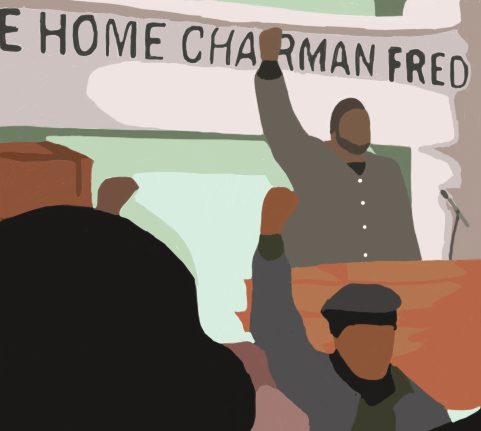“Judas and the Black Messiah” stands as an evocative tribute to Fred Hampton

Released on Feb. 12, “Judas and the Black Messiah” serves a stunning tribute to Fred Hampton.
April 9, 2021
This review contains spoilers.
Released on Feb.12, Shaka King’s stunning biopic “Judas and the Black Messiah”, serves the audience a film that immortalizes the life of Fred Hampton (Daniel Kaluuya), the Illinois Chapter Chairman of the Black Panther Party, without diluting the reality of Hampton’s anti-capitalistic social and economic perspectives.
The biopic follows the story of the Black Panther Party’s and Hampton’s goals of Black liberation and how his activism and rhetoric made him the target of the FBI. Hampton is portrayed as a charismatic and charming leader, with a natural ability to speak to the hearts of regular Americans, he’s an activist who appeals to everyday Americans, not by fear-mongering or scaring them about the consequences of the world if it continues without change, but rather with the promise of a better future and his ability to bring people of all backgrounds together, in the cause of liberation. Hampton’s ability to speak persuasively to people is shown in the film, through his success in uniting all of Chicago’s gangs with the cause of the Black Panther Party. Throughout the film, we see King’s reflection of Hampton’s numerous speeches and the Black Panther Party’s actions address topics including economic justice, racial justice, and gender equity, through the acts of liberation and political revolution.
Hampton’s revolutionary rhetoric and stances are contrasted throughout the film with the FBI agents who are working to bring him to his demise. A short scene at the beginning of the film focuses on FBI Director J. Edgar Hoover’s claim that the Black Panther Party exists as the “greatest threat to [American] national security,” a nod to the Bureau’s tendencies to fear Black revolutionary political figures. The audience is then introduced to the main character of the film, William O’Neal (LaKeith Stanfield), a cunning and intelligent car thief who, in 1966, shortly after completing a successful heist, was apprehended by the FBI. In his interrogation room, he was given a choice, either go to prison for grand theft auto or work with the FBI as an informant to infiltrate the Black Panther Party and betray and takedown Hampton, and other revolutionary activists. O’Neal chooses to work with the FBI, and the rest of the film goes on to relay O’Neal’s true historical experience infiltrating one of the United States’ biggest economic and racial movements and the internal dilemma he endures as a result.
The film observes O’Neal’s journey and experience with the prolific Fred Hampton and the moral push-and-pull he experiences. He can either choose to join the Black Panther Party and risk being apprehended and arrested by the FBI or he can continue to serve and be paid as an informant for the FBI, but betray a cause that would liberate him as a Black man. Historically and cinematically, we as the audience know he chooses the latter. In fact, the lack of grey-ness in the film is what drives home the verisimilitude of these legendary performances by Kaluuya and Stanfield. We as an audience, are never left to wonder about a character’s motivations in a situation because the style of King’s directing never leaves it up to interpretation. We are told and taken through each of the main characters’ goals and ambitions throughout the film, ultimately turning the audience to a state of awareness of the dynamics of O’Neal’s betrayal of the Black Panther Party. However, the revelation of that betrayal never occurs, until decades later when O’Neal is interviewed by “60 Minutes”, and confesses his disloyalty, and how his actions led to the eventual dissolution of the Illinois Chapter of the Black Panther Party.
The audience, already aware of this historical series of events, begins to mourn and preemptively await the fate of Hampton, and that’s what makes this film a tragedy: its inevitability. The film dedicates a few of the ending scenes to the infamous 1969 Chicago Police raid into Hampton’s apartment which resulted in his assassination, with his pregnant wife, Deborah Johnson (Dominique Fishback), in bed next to him.
“Judas and the Black Messiah” is an evocative retelling of the tragic death of the figure who revolutionized American activism, but could not outlive the American establishment that feared his emancipative politics. Shaka King delivers a stunning and thrilling recount of one of the most famous revolutionary groups in American history and leaves audiences in awe of a story that was written more than half a century ago.





